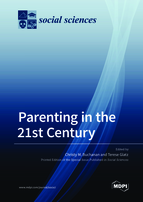Parenting in the 21st Century
A special issue of Social Sciences (ISSN 2076-0760). This special issue belongs to the section "Family Studies".
Deadline for manuscript submissions: closed (1 November 2021) | Viewed by 92740
Special Issue Editors
Interests: beliefs about adolescents; parenting and adolescent adjustment; development of civic attitudes and engagement during adolescence and emerging adulthood
Interests: parenting; parent-child relationships; adolescent development
Special Issues, Collections and Topics in MDPI journals
Special Issue Information
Dear Colleagues,
The nature of parenting and parent–child relationships is often dramatically affected by the historical period in which one raises children. Historical changes in a myriad of possible areas, ranging from gender roles and healthcare to technological innovations and globalization, influence values, norms, and expectations for parents as well as the unique opportunities, pressures, and challenges they face.
Historical and cultural change over the 20th and 21st centuries has been rapid and all-encompassing. The invention, rise, and pervasiveness of smartphones and social media is only one example of a historical development that has rapidly and dramatically changed the landscape of parenting over the first two decades of the 21st century. Many other technological, scientific, and social changes of the 21st century have affected the task of parenting and parent–child relationships directly or indirectly. The impact of these changes has sometimes been positive, sometimes negative, and sometimes both simultaneously. The impact sometimes has universal features, or sometimes varies for parents in different demographic (e.g., racial, ethnic, and economic) contexts.
The purpose of this Special Issue is to invite papers that explore the unique features of and challenges for parents in the 21st century. We welcome contributions from all the social sciences including anthropology, economics, family studies, history, law, public health, public policy, social policy, sociology, social work, and psychology. We seek thoughtful, data-driven analyses of contemporary challenges and opportunities, how these differ from parents in previous generations, and the impact on 21st century parenting and/or parent–child relationships. Analyses should include direct analysis and/or theoretically informed reflection on issues of diversity as related to the chosen topic. Papers should also speak to implications for research, policy, and/or practice. Both empirical reports and analytical reviews will be considered.
Prof. Dr. Christy M. Buchanan
Dr. Terese Glatz
Guest Editors
Manuscript Submission Information
Manuscripts should be submitted online at www.mdpi.com by registering and logging in to this website. Once you are registered, click here to go to the submission form. Manuscripts can be submitted until the deadline. All submissions that pass pre-check are peer-reviewed. Accepted papers will be published continuously in the journal (as soon as accepted) and will be listed together on the special issue website. Research articles, review articles as well as short communications are invited. For planned papers, a title and short abstract (about 100 words) can be sent to the Editorial Office for announcement on this website.
Submitted manuscripts should not have been published previously, nor be under consideration for publication elsewhere (except conference proceedings papers). All manuscripts are thoroughly refereed through a double-blind peer-review process. A guide for authors and other relevant information for submission of manuscripts is available on the Instructions for Authors page. Social Sciences is an international peer-reviewed open access monthly journal published by MDPI.
Please visit the Instructions for Authors page before submitting a manuscript. The Article Processing Charge (APC) for publication in this open access journal is 1800 CHF (Swiss Francs). Submitted papers should be well formatted and use good English. Authors may use MDPI's English editing service prior to publication or during author revisions.
Keywords
- parenting
- parent–child relationships
- historical trends
- social change







